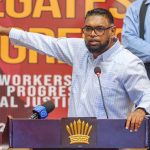antiguaobserver.com
Antigua and Barbuda’s transition to renewable energy will be a challenge, according to the International (IMF) Monetary Fund’s mission team to the island.
In its preliminary report issued on Friday, the team — led by IMF Mission Chief for Antigua and Barbuda, Emine Boz — said that the country will require around 25 percent of its GDP in up-front capital costs in order to successfully carry out its energy transition plan.
The IMF’s Concluding Statement said the International Renewable Energy Agency predicts that this could lead to 40 percent reduction in energy cost for the country.
The findings highlight the challenge that the country faces in moving away from fossil fuels with recent news of the arrival of four LNG storage tanks on island were hailed as part of the move towards cleaner energy, according to Energy Minister Melford Nicholas.
The IMF stated that regulations have been a barrier to the utilisation of solar power by households and businesses, which has made the transition more gradual.
The findings indicate that limited local financing options for climate resilience projects, such as upgrading the electricity grid, expanding the use of electric vehicles, and investing in new wind and solar generation revealed the importance of donor resources.
“The authorities are utilising funding from the Green Climate Fund, Adaptation Fund and Global Environment Facility to support 19 active projects of various sizes.
“Given fixed costs of developing and reporting, they are shifting their focus towards larger projects, facilitated by upgrading accreditation levels with these funds.
“The authorities have operationalised the Climate Resilience and Development Fund, which could also help to co-finance climate-related projects,” the statement read.
The finding also highlighted efforts made to explore new solar and wind projects, and that “upgrading the curriculum at the Antigua and Barbuda Institute of Continuing Education would help train new workers for this transition”.
The suggestions from the IMF team come as the organisation predicts a real GDP growth rate of 5.5 percent for 2024 with a nominal growth rate of 8.6 percent.
Real GDP is adjusted for inflation, unlike nominal GDP which measures the growth of the country at its current rate.
“Growth is expected to moderate and gradually converge to its long-term trend of about 3 percent and price pressures are expected to dissipate in 2024,” the IMF stated.
Among its other structural policy reviews, the IMF also noted the importance of increasing flight connectivity and cruise ship homeporting.
The Mission team also highlighted the significance of operationalising LIAT, which will “help to further improve intra-regional flight connectivity and complement the recent expansion of other airline companies’ presence in Antigua and Barbuda”.
The government has long prioritised the return of LIAT — which was placed into administration as a result of the Covid-19 pandemic — under the name LIAT 2020 Ltd, which is expected to debut in November.
This push continues in spite of other regional governments’ reluctance to support Antigua and Barbuda’s efforts, including St Vincent and the Grenadines Prime Minister Dr Ralph Gonsalves stating on Observer media that there was more appetite for the creation a new airline entity with no link to LIAT.
Furthermore, Minister of Tourism Charles Fernandez and other tourism officials have spoken about increasing homeporting operations in Antigua and Barbuda following a successful first operation by the Arvia in January.
Additionally, the IMF said that measures should be put in place to accelerate the reduction of unemployment and underemployment in the twin island nation.
“Active labour market policies should be strengthened to help address the slow recovery in formal employment, which has remained almost 12 percent below its 2019 level in 2022.
“The existing one-stop employment centre should enhance its capabilities to match employers with employees.
“The New Work Experience Programme should be made more effective by evaluating participants and by ensuring their successful exit from the program,” the findings noted.
A Concluding Statement describes the preliminary findings of IMF staff at the end of an official staff visit or mission, in most cases to a member country.
While the views expressed in the statement are those of the IMF staff who conducted the mission and do not necessarily represent the views of the IMF’s Executive Board, based on the preliminary findings, a report will be prepared that, subject to management approval, will be presented to the IMF Executive Board for discussion and decision.










